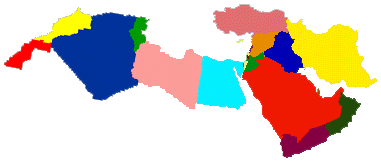Mitt Romney responded too quickly to the first reports about the attack on the consulate in Benghazi. It made me think how important it is to think before you speak, and in foreign policy to not "just do something" but sometimes to wait until the time is right and you know the right thing to do.
I tend not to write about foreign policy because I don't know enough about it. I will make an exception to that policy now.
Foreign policy issues can be described in terms of their importance. They can also be described in terms of the urgency of making a response. The media tends to overstate both the importance of conditions and the urgency of making a response.
U.S. policy during the Cold War was one of containment. The policy was to contain Communism within the USSR, Communist China, and the Warsaw Pact nations until it fell due to its own internal contradictions. The policy eventually proved successful. It was enunciated soon after World War II, but was a variation of the "French cordon sanitaire, used to describe Western policy toward the Soviet Union in the 1920s." It was an important policy, but one that had to await the defeat of the Axis in World War II to be ripe for application -- the Communists were vital allies in the war.
We can talk about economic foreign policy, and there are a number of issues of varying importance and urgency, such as dealing with the weakness of the Euro, achieving appropriate values of different currencies in international trade, reducing the worst aspects of global poverty, and assuring the long term, stabile growth of the world economy.
We can also talk about security in foreign policy, and here too there are issues of varying importance and urgency -- prevention of nuclear proliferation, reduction of the threats of terrorism, prevention of nuclear war, achieving peace between Israel and Palestine.
There are also what I like to think about as global systems problems: the amelioration of climate change, dealing with pandemics, organizing for the effective global use of the seas and space, prevention of desertification and loss of biodiversity, etc.
We also think of foreign policy in geographic terms, in which all of these concerns are considered in terms of a specific region. Thus we talk of our Latin American policy or our policy with respect to sub-Saharan Africa. Our European policy has always been important, but I think the Obama administration has been helpful in raising the concern for Asian-Pacific policy.
Policy toward North Africa and the Middle East is also important. This is not new -- think of the debates on the disposition of the former territories of the Ottoman Empire after World War I. It has been a central concern of U.S. foreign policy after the creation of Israel. It has become more important with the wars in Iraq and Afghanistan, and more problematic with the Arab Spring and the civil war in Syria.
Some are calling for a coherent policy now for the entire region, comparable in scope and force with the Cold War containment policy, the Monroe Doctrine, or the Point Four policy for rebuilding Europe and Japan after World War II. The question I would pose is whether the time is ripe for such a policy. I suspect that "muddling through" for a while until the domestic politics of the region settle down more and U.S. interests become more clear might be better.
What seems to me to be urgent is the restoration of U.S. economic, military and soft power. The effectiveness of our foreign policy rests on these powers. The current weak economy, the magnitude of the debt (personal as well as governmental), and the balance of payments deficit greatly limit our international effectiveness. I read that after a decade fighting two wars (not to mention our intervention in Libya) on the cheap, our military is very much weakened. The Obama administration has done little to restore the damage done to American soft power by the Bush administration, as is clear from the anti-American demonstrations occurring now in the world. If we get our own house in order, we will be in better shape to help our neighbors.

No comments:
Post a Comment